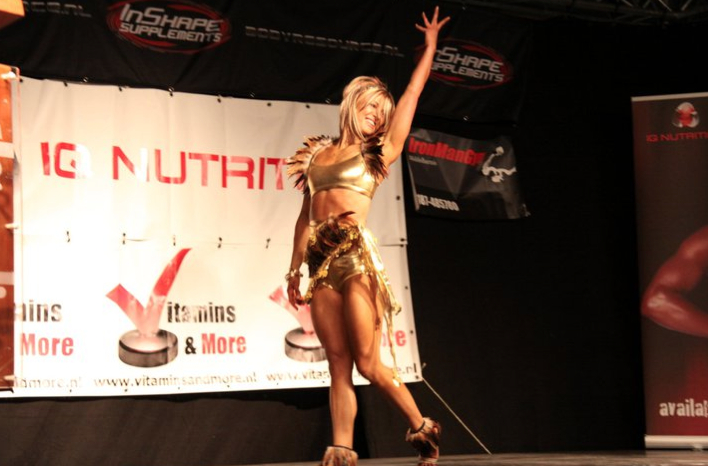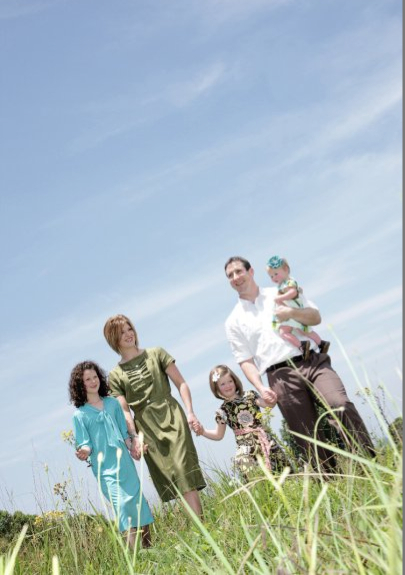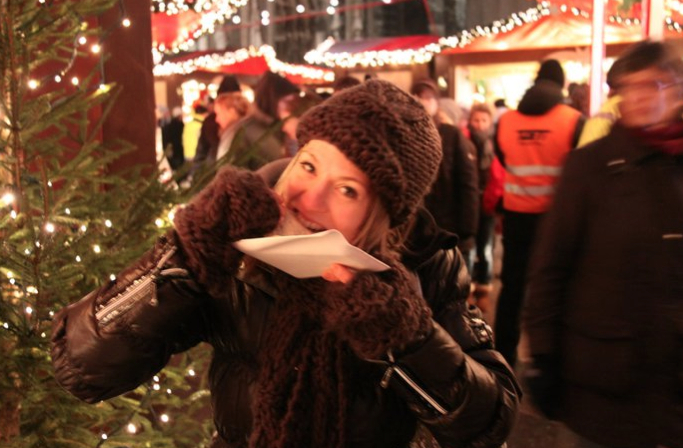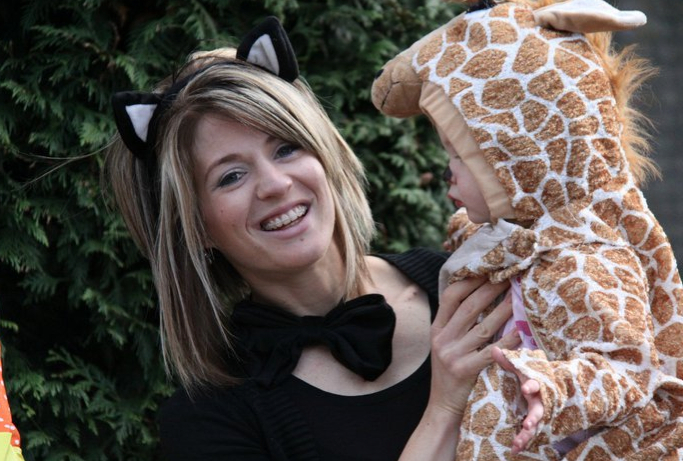Involved in fitness training since high school, mother of three Claire Harries recently became a body-building champion in Holland. A native of South Africa who recently moved back to her home country, Claire talks about how body building has contributed to her mental and spiritual strength, her competitive nature, and her talent for entrepreneurship, including a surprising business for a body-builder: cake decorating.
You are the 2011 Juliette Bergmann C-Class Figure cup holder. How did you come to be involved in Dutch body-building?
When I was fifteen years old, a gym opened near where I grew up in Durban, South Africa, and my five sisters and I all joined. I learned that a member of our ward was a personal trainer. He showed me how to do weight exercises and taught me how to work really hard. He told me, “You will find that training like this will develop your mental strength.” I’d be at the gym at 5:00 a.m. when it opened, so I could work out before school started at 8:30 a.m. So that’s how I started.
I thought that when I was grown up, I’d live in the same area for the rest of my life. But while we were in university, my husband, Bryn, who was studying mechanical engineering, got a great job with an oil company in the Netherlands. We were there for ten years, and we have just this year moved back to South Africa.
Shortly after we’d moved to Holland, I gave birth to Madison, our second daughter, and was trying to get back into shape. At the neighborhood shops, I saw a poster advertising an aerobics class just around the corner from my apartment block. So while the baby slept in her stroller, I would do my exercise. I became friends with the instructor, Jenny.
Eventually I started doing personal training with Jenny. She had begun entering—and winning—body-building competitions. She said, “Stick with me, and I’ll teach you everything I know.” She really believed in me. She said, “You should be on the podium one day. You’ve got the body for it, you’ve got the build for it, you’ve got the mental strength for it.” I wasn’t sure whether I wanted to compete, but I loved the training.
I trained seriously with Jenny for a year, and then I fell pregnant with Sophie, our third daughter. I was in a wonderful place in my training, getting close to where I could go onto the stage, so I was a little disappointed that I couldn’t continue at the same pace. But having children and raising a family have always been a priority for me. I was excited that I was going to have a baby, and Jenny said, “Having a baby makes you stronger.” I continued training with Jenny for the first six months of the pregnancy, and on my own right up to the delivery. It was the easiest pregnancy of the lot because I was so fit.
About six months after the delivery, I was back to where I had been before the pregnancy, and I resumed strength training with Jenny. She asked, “Do you want to go on the podium? Let’s set a date and work toward it.”
Certainly, picking the date was what I needed. If you don’t set the date, you don’t achieve the goal. You just change your mind and don’t do anything. So we picked the date for a Musclemania competition in Milan, Italy.
I told Jenny that I didn’t have much time to train. I said, “Family comes first. I can’t let this take over my life. But whatever time I have left over, I’ll give to training with you.”
Preparing for competition is demanding. I was training six days a week, sometimes twice a day, a different muscle group every day, and with Jenny three times a week. The diet is strict, although really healthy, with lots of vegetables and fresh food, but it’s not something you can do for an extended period of time. You’ve got to bring your body’s fat percentage down to about thirteen or fourteen percent, which is very low.
Bryn was fantastic. He looked after the children when I needed to train in evenings and on weekends and he understood when I had to eat all these crazy things like lots of green beans and broccoli and boring chicken and eat them in fixed quantities at fixed times when he didn’t feel like eating. But you’ve got to do it all or nothing.
Church friends were a fantastic support for me, too. They helped me make lists of what I had to bring to the competition. They helped me with my make-up and with my hair. They even came along with me to Milan. Jenny, my trainer, was wonderful, too. She came with me even though she wasn’t competing and helped with my tanning, with my costume. Definitely it was a team effort.
Preparing required so much dedication, so much discipline, and to finally just reach the day of the competition was rewarding.
What is the competition itself like?
The morning of the competition you have a good breakfast and then you go for the pre-judging, which is the actual, proper judging of the show. You do posing, modeling, and, for the Fitness competition, your fitness routine. I do completely natural figure training. Some people use steroids, but I don’t believe in doing that at all, so just before I go on the stage, I do some push-ups and some elastic band exercises to get the muscles pumped up.
I was absolutely exhausted between sections of the competition, and I struggled with so many negative thoughts. It’s easy to let doubts creep in. I saw other people who looked so much stronger than me. I had to crowd those things out, to be mentally tough.
After the pre-judging, you have the afternoon to relax. The evening show is public. You do the same thing again, but obviously it’s much less stressful because the evening show counts for a much smaller percentage of the score, maybe 25%. People can relax and put on the show. And then the final call, and the trophies are handed out, and that’s the end of the day. In my first competition, Musclemania in Milan, I took seventh place. Six months later, I took first place and won the Juliette Bergmann cup.
Some argue that competitions like this objectify women. How do you respond to that?
A lot of people don’t understand that this is a sport. Still, I must say I prefer the Fitness competition to the Figure competition. In the Figure competition, you model and pose. In the Fitness competition you also do a routine, showing how you use your strength. I didn’t feel comfortable just being a model. I never wanted to get up on the podium just to show myself. I wanted to be able to do something with what I had learned.
In a Fitness competition, I can also choose what I want to wear. The judges want to see the muscle groups obviously, so the calf muscles, the shoulders, and the legs need to be exposed. I enjoyed putting together a costume that tied into the music for my routine.
There are people who live for the competition. I don’t, but I had to set the competition goal to take my body to that extreme point. I needed the competition to get there. I must say, looking at both the training aspect and the competition aspect, I enjoyed the journey more than the destination.
How did people respond to you while you were training?
Some people don’t really understand what you’re doing when you are in serious training. Your body goes through an enormous change, and a lot of people thought I was doing something really crazy. They would say, “Your body has changed over a period of six weeks. Are you OK?”
A friend at church said, “You must have an eating disorder.”
I said, “You ought to see what I’m eating! I’m eating so much!” I know she was speaking out of love and concern for me, but she didn’t understand what I was doing.
Others did understand, though, and were a fantastic support.
Your first trainer, back in high school, told you that training would help you “develop your mental strength.” Have you found that to be true?
I’ve found strength-training to be a fantastic way to make me stronger, not just physically but mentally. Once I get to the seventh repetition of lifting a very heavy weight, I can’t do it another time. But my mind takes over and keeps me going.
I have used that mental strength in motherhood. We want to develop in our daughters the drive and determination to achieve their goals. Because I have achieved my goals, I understand better how to help them achieve their goals. For example, Savannah wanted to earn money for a fancy backpack after we’d already given her one for school. So we asked her, “What’s the goal?” We gave her extra chores and then reminded her to keep putting one foot in front of the other, to keep going.
Heavenly Father has given us our talents. He wants us to succeed. Satan doesn’t want us to succeed. He gives us doubts. Through strength-training, I’ve learned to put my mind to something, believing that I can do it, and then to not allow doubt and thoughts of failure to creep in.
How did you turn your interest in fitness into not just a hobby but a job?
A gym near where I lived in Holland sponsored me and I got training as an aerobics instructor. The training was all in Dutch, which was a stumbling block because I wasn’t fluent in Dutch. I was given a three month limit to learn all the choreography and be able to give the entire class on my own in front of a video camera, making a tape for the examiners to mark. So I had to learn fast and do the technique really well.
When I started teaching aerobics, the most difficult part was to feel easy in front of adults. I wasn’t sure how to connect with adults. Teaching children is natural for me. They are so loving and forgiving and non-judgmental. I have a teaching degree, specializing in Montessori education, and I taught in a pre-school in Durban. I wasn’t sure how to help adults enjoy what they were doing. But with practice it got easier.
I’ve found that giving a class to English speaking people–British or whatever–is very different from giving a class to Dutch people. I have really enjoyed exploring the cultural differences, learning what the Dutch find interesting or funny so I can crack a few jokes and make them want to come back. It was a real challenge at the beginning.
Shortly after Sophie was born, I did a course to certify as a personal trainer as well. But my children are young and I knew I wanted to be with them while they are growing up, so I would only give training to clients between 9:00 a.m. and noon, while the girls were at school and Sophie could be at the crèche at the gym. And then in the afternoons I was free and available to the kids. There’s always someone who wants training, and it’s an easy way to make good money in the Netherlands. But I didn’t want to allow personal training to consume my life.
Competing helped establish me as a personal trainer. I got so many personal training clients because they saw that I was living what I was trying to teach, whereas some personal trainers I know try to teach by word and not by action. Because clients saw that I was achieving my goals, they trusted that I could show them what it would take for them to achieve their goals, whether it was to run a 10K race or to get into a dress they want to wear to a wedding.
A lot of people coming to the gym want to change what they look like, want to change their bad habits, but they don’t know how. I am able to use skills from my Montessori teaching days to help my clients learn how to change. I really enjoy coaching and training people. My motto is, “If you do what you’ve always done, you’ll get what you’ve always got.” I help my clients start eating healthily and exercising properly. That combination is a winner.
In addition to teaching aerobics classes and offering personal training, you ran a cake-decorating business in Holland. How do you reconcile the cake business with the fitness business?
A lot of people ask me that! Here I am, baking high-calorie, very unhealthy things and all the time preaching something very different. I love baking and decorating and sharing what I make with people. Also, it’s a wonderful tool to get closer to my girls. I enjoy teaching them to bake and baking with them.
My cousin’s wife has a very successful cupcake business in Durban and she has asked me to open a Capetown branch, so I will have a cake business here, too. It’s perfect. I can do just as much or as little as my schedule permits.
I’ve always got some business going. I’m now learning to do eyelash extensions and waxing and spray-on tanning, too. These business ventures of mine–personal training, cake decorating and eyelash extensions–seem unrelated, but the common thread among all of them is that I can choose my hours, I can do them from home, and I can do them with my family.
How did you become so entrepreneurial?
Part of it is that I’m South African. Every South African has some little business going. You have to be entrepreneurial to make a go of it. I certainly tried to be entrepreneurial in Holland. I don’t know if many Dutch people appreciated the way I tried so many different things: I sold a line of healthy muffins for the gym’s restaurant and I was a personal trainer and I was an aerobics instructor. I think people wondered, “Who does this girl think she is?” But that’s who I am. I’m always busy.
I was very blessed to have a mother who was entrepreneurial. She worked from home, running a very successful private pre-school, so she was always able to be there for the family. Like her, I try to do things that allow me to be home after school for my daughters, to focus on their activities, just to be around to talk.
My father was also very keen for us to learn new things and to start businesses from them. When I was in high school, I learned how to do cake-decorating. I said to my dad, “I’ve learned how to do this, and I want to make some money from it. Can you help me pick up something?”
He said, “Sure. Christmas is coming.” In South Africa we have British Christmas cakes which are decorated in a traditional way. He suggested I market Christmas cakes to the parents in my mom’s school. A whole bunch of people placed orders, and I made the cakes and iced them. I was extremely busy at Christmastime for the next three years making Christmas cakes. And people started asking me to make anniversary cakes and birthday cakes too.
I was able to pack that skill in a suitcase and take it to Holland with me. And now I’ve packed it in a suitcase again and brought it back to South Africa. That’s something I love to do, to learn a new skill and to pack it in a suitcase and take it with me.
You’ve had a very busy year, with a competition and an international move. How do you stay spiritually nourished at times of stress?
When life gets busy, it’s easy for the basics to fall away, and that’s how we get further and further away from our Heavenly Father. It’s important to be anxiously engaged in doing the things He’s asked us to do, the simple things like reading our scriptures.
I’ve become very aware of the importance of balance in life. Especially when we’re busy, we need to constantly assess whether we’re in the “thick or thin” of things. For example, all the training I did for competition was good, but if I had ever let it become so dominant in my life that it drove out more important activities–my family, scripture reading—then it would have become a “thin thing.”
I think Heavenly Father expects us to develop our talents and become stronger but to never lose sight of what really matters. We must be wise stewards.
At A Glance
Claire Harries
 Location: Cape Town, South Africa
Location: Cape Town, South Africa
Age: 32
Marital status: Married in the Johannesburg, South Africa Temple on 8 Jan 2000 to her sweetheart, Bryn Harries
Children: 3 girls aged 10, 7 and 2.5
Occupation: Harries Family Chief Executive Officer aka wife to Bryn, mother to Savannah, Madison and Sophie, personal trainer, pastry chef
Schools Attended: Kloof Pre-primary-High School, College of Modern Montessori, University of South Africa
Languages Spoken at Home: English, Dutch
Favorite Hymn: “I Know That My Redeemer Lives”
On The Web: Family blog: www.brynandclaire.blogspot.com. Workout on YouTube: http://youtu.be/5NMkbFFa4R4
Interview by Annette Pimentel. Photos used with permission.
At A Glance






